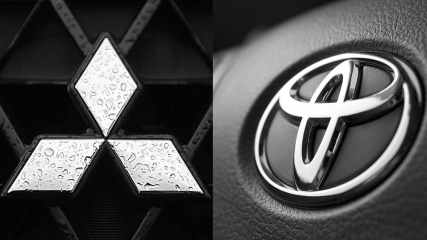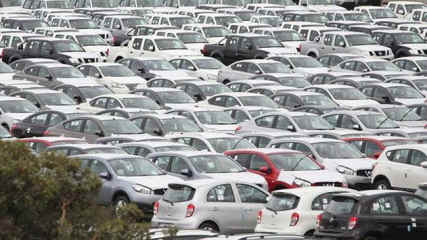Mitsubishi Pajero 2014 News
.jpg)
Mitsubishi issues national reminder to replace deadly Takata airbags
Read the article
By Spencer Leech · 27 Feb 2018
Mitsubishi Motors Australia (MMAL) has taken out full-page advertisements in national newspapers begging for action from car owners affected by the global Takata airbag recall.Drivers and passengers of vehicles affected by the Takata airbag recall run the risk of being impaled by shards of metal that are propelled out of the airbag when deployed.It has been reported that at least 22 people have been killed as a result of defective Takata airbags, including an Australian man who lost his life in a car accident in Sydney last year. MMAL PR boss Karl Gehling suggests that while these incidents do increase awareness, many owners continue to ignore the risk.“During 2017, the publicity around the fatality in Sydney from a faulty Takata airbag inflator led to significant media coverage and a subsequent increase in customer awareness of this serious issue,” he said.“Over the past few months we have noticed the number of customers presenting their vehicle for repair has dropped significantly.”Since the announcement of the recall, Mitsubishi Motors has replaced around 136,000 defective airbag inflators from a total 235,151 in Australia.This means thousands of potentially-deadly Mitsubishi Lancer, Triton, Pajero and I-MiEV models are still in circulation.All repair work is carried out at a Mitsubishi dealership and is free of charge to vehicle owners.“In some cases we have sent up to six letters to owners to advise them of the need to replace their Takata airbag inflator without any result,” said Mr Gehling.“This owner indifference or apathy to the risks from the Takata airbag inflator fitted to their vehicle has prompted us to publicly notify all owners in the hope that it will generate greater impact and encourage more owners to action the recall.”To get the attention of the remaining affected vehicle owners, Mitsubishi Motors has purchased full-page advertisements in newspapers around the country.The advertisement shows a letter signed by MMAL CEO John Signoriello that reads:“To our Mitsubishi owners“Since the announcement of the global Takata airbag recall, Mitsubishi Motors has been working hard to replace all affected airbag inflators.“In Australia, there were 235,151 Takata beta airbag inflators fitted to Mitsubishi vehicles affected by this recall. Over 136,000 Takata inflators have been replaced so far with an inflator from another manufacturer.“For all remaining affected vehicles, there is a risk to the vehicle occupants in the event of an accident that results in the airbag inflator deploying. There is a potential risk that due to excessive internal pressure, metal fragments could shoot out towards the vehicle occupants causing serious injury or even death.“Testing by Takata Corporation of their airbag inflators removed from Australian cars has shown there is a clear risk to vehicle occupants. Due to degradation of the inflator propellant, the airbags can rupture on deployment.“We are seeking all remaining customers with affected vehicles to make a booking with their nearest dealer to address this recall, which is free of charge."The advertisement also directs Mitsubishi owners to the MMAL website where they can input their Vehicle Identification Number (VIN) to see if their car is affected. “We urge all customers who own one of these models to verify if their vehicle is subject to the Takata recall and make a booking with your local dealer to replace your Takata airbag inflator.”Mitsubishi also has a dedicated recall phone line (1800 931 811), which can be used for free between 9am and 5pm, Monday to Friday.

800,000 cars recalled in two days
Read the article
By Joshua Dowling · 30 Jun 2016
Cars are either being built worse -- or companies are getting better at detecting faults.a range of models made over the last 10 years replacing potentially deadly Takata airbags in 1.3 million cars in Australia. a second, airbag-related recall for the Priusreplacing potentially deadly Takata airbags in 1.3 million cars in Australia

Why do Australia's best-selling SUVs still lack rear cameras?
Read the article
By Joshua Dowling · 11 Jun 2014
New Honda Jazz sets new benchmark for rear view cameras: $14,990.

This week a good time to buy a new car
Read the article
By Joshua Dowling · 25 Mar 2014
New-car prices will hit new lows between now and the end of the month as Japanese brands push to reach their sales targets before the end of the Japanese financial year, which is March 31.March is typically the second-biggest month of the year for new-car sales behind June, the end of the Australian financial year. The good news for car buyers is that the heavy discounting from the Japanese companies also brings down prices across the industry as rivals try to compete.The profit margins on some cars are so slim that dealers claim they only make money on window tinting -- and finance if arranged through the dealership. Last year, the Toyota Corolla and Nissan Pulsar had their prices wound back by 20 years to $19,990, and others followed.The Japanese Government has for the past 12 months artificially devalued the Yen to boost exports and keep their car factories running at full capacity. Car companies and dealers refused to comment on-the-record about the "D-word" -- discount -- but a search across the industry found some sharp deals on popular cars.The cheapest models from Japanese brands are the Suzuki Alto ($11,990 drive-away) and the Mitsubishi Mirage ($12,990 drive-away), both about $3000 off their full recommended retail prices. Despite their bargain prices both five-door hatchbacks come with the latest safety features, including six airbags and stability control.Meanwhile Suzuki has the cheapest small car below $20,000 with a built-in navigation system: the special edition Swift Navigator is $16,990 drive-away, about $3500 off.Nissan's website says its Pulsar small car is $22,315 drive-away but we found several dealers prepared to sell one for $18,990 drive-away, more than $3000 off. "We'll sell you a car but there's nothing in it for us," said one Nissan dealer who did not want to be named. "That's a white car with manual transmission and standard-issue number plates." Automatic transmission typically adds $2000, metallic paint adds up to $550 on some brands and, in NSW, premium number plates cost about $60 more than standard-issue plates.The only people not celebrating the sharp new-car prices are the dealers. "It's not uncommon to not make a dollar on the car," said a Mitsubishi dealer. "We hope to make it back on accessories, finance or when the customer comes back to get the car serviced."Car dealers typically get a commission of about $1200 on the finance on a $20,000 car -- if the finance is arranged through the dealership. "That's more than the profit on the car," said another dealer. Buyers might also get lucky if the dealer is a few cars short of their monthly sales target."Sometimes you'll rip up a car (sell it below cost) in the last one or two days of the month, just to get over the line," said one multi-franchise dealer principal with more than 20 years' experience in the trade. "That sale could mean the difference between getting a big bonus from the factory, or nothing."The biggest discounts are on the dearest cars. The Nissan 370Z sports-car is now $59,990 drive-away, it was $72,000 plus on-road costs the same time last year, a saving of about $15,000. The Nissan Leaf electric car is now $39,990 drive-away, compared to $51,500 plus on-road costs when it was launched two years ago, a saving of about $14,000 off the full RRP. The Mitsubishi Pajero GLX-R 4WD wagon is now $54,990 drive-away -- it is normally $60,000 drive-away -- but dealers we spoke to said there was at least a further "$1000 to $2000 wriggle room" left in this deal.For those looking for a family sedan the locally-made Toyota Camry can be bought at a discounted price of $29,990 drive-away with Toyota's 1 per cent finance, about $3000 off the full RRP -- and more than $3000 off the repayments at market interest rates. This deal is unique because, customarily, low interest rate offers apply only to the full RRP of the car, which is how the car companies fund the deal.In most cases it is cheaper to arrange your own finance and haggle hard on the price of the car. But Toyota has bucked this trend by offering a low interest rate as well as a drive-away price on the Camry to keep the struggling Toyota factory at Altona running.Meanwhile the Mazda CX-9 Luxury SUV normally sells for $52,980 plus on-roads, but it is now $51,990 drive-away, a saving of about $5000 off the full RRP. But as with the Mitsubishi Pajero deal, Mazda dealers say there is still a further $1000 to $2000 to negotiate off the luxury version of the Mazda CX-9 if buyers sign on the dotted line by the end of the month.This reporter is on Twitter: @JoshuaDowling





